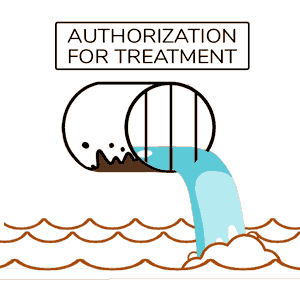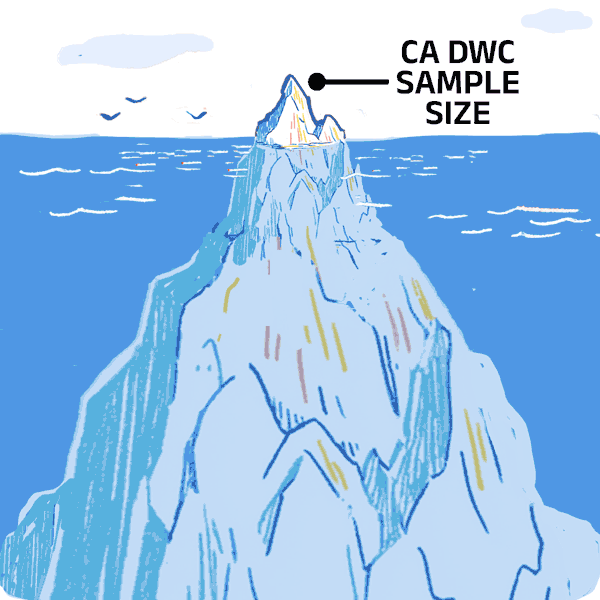Sedgwick Authorization Sewer - Why CA Needs UR Reform

An injury occurs at work. The injured worker sees a doctor. The doctor concludes that the worker needs a consultation from a specialist. Per California law, the treating doctor sends the employer’s claims administrator, Sedgwick Claims Management, the required Request for Authorization (RFA) form requesting approval for the consultation.
Sedgwick agrees the injured worker needs the requested consultation — but Sedgwick’s Senior Claims Examiner questions the need to send a formally signed document authorizing the medically necessary treatment. When the requesting doctor specifically asked for formal authorization documentation, the Examiner replied:
“Why can’t you use this email?”
To answer the Senior Claims Examiner’s question: California law has mandated that providers include proof of authorization when sending a bill for the care provided to an injured worker for the last ten years. California law allows Sedgwick to deny payment for the required consultation if the bill is sent without proof of authorization.
This tale exposes the extraordinary, potentially care-delaying friction Sedgwick (one of California’s largest Third-Party Administrators (TPAs)) inflicts on injured workers and their doctors. Rather than assist the requesting doctor in obtaining care for the injured worker, Sedgwick’s Senior Claims Examiner initially refused to provide the documentation required to obtain the necessary care.
While Sedgwick eventually furnished a signed RFA, this tale should make employers question Sedgwick’s website advertising promising a team of “experts” who work together to help injured workers “get the care and resolution they need to recover.”
If (and it remains an “if”) this injured worker ultimately receives the medically necessary care, the hero is the requesting doctor who waded through the sewer of Sedgwick’s Utilization Review (UR) process to obtain the necessary authorization documentation.
Requesting Physician Insists on Documented Authorization
The story below is a perfect example of the roadblocks physicians must navigate to help California injured workers receive medically necessary care.
To request care from a specialist, the requesting physician submitted the mandatory ‘DWC Form RFA’ (shown below) listing the treatment the physician believed was medically necessary.
The Sedgwick Senior Claims Examiner responded to the RFA by sending an email to the requesting physician with a single sentence: “Speech and language consult for memory training is authorized.”
That’s it.
While the ‘DWC Form RFA’ includes a section for the claims administrator to formally approve treatment, there are no regulations mandating that claims administrators utilize that section. Legally (and absurdly), Sedgwick can respond to the RFA by sending “proof” of authorization scrawled in crayon on the back of a takeout menu.
But to guarantee payment for treatment, California billing regulations mandate providers must send their bills with proof of authorization. Without a signed document authorizing treatment, there’s no way for the specialist to bill compliantly.
Since the referring doctor had to convince the specialist to treat this injured worker, the doctor sent the email below, asking for a more substantial authorization.
Rather than offering to assist the requesting physician in obtaining care (or thanking the requesting physician for his efforts on behalf of the injured worker), the adjuster responded with a single question: “Why can’t you use this email?”
Well, we can think of 44,899 reasons that no doctor should take Sedgwick at its word or expect the TPA to adhere to California laws and regulations.
While providers must always adhere to strict requirements when requesting authorization, there are no requirements for how the claims administrator grants authorization. And when dealing with Sedgwick in particular, providers need unequivocal proof of authorization; the Third-Party Administrator (TPA) isn’t exactly known for consistently honoring its authorizations in any format.
The Senior Claims Examiner eventually provided a signed RFA form, but Sedgwick was technically within its rights to refuse to sign the RFA — and that’s a problem.
Employer Medical Provider Network (MPN) - Withdrawn
Despite the clear and unambiguous requirement that authorization guarantees payment, Sedgwick is also one to deny payment for authorized services based on non-participation in MPNs that do not apply or even exist.
To be thorough, daisyBill (not the adjuster) checked the Division of Workers’ Compensation (DWC)’s MPN database to confirm that the employer (the University of California) does not currently maintain an approved MPN.
Sedgwick’s UR Sewer
Worse, despite all the effort put forth to preclude a payment dispute, Sedgwick can still deny payment to the specialist with the known 3-step grift:
- Deny payment for literally any reason, true or false
- Falsely deny the provider’s Second Review appeal as a “duplicate bill”
- If the provider pays $180 to request Independent Bill Review (IBR), falsely assert not to have authorized the treatment provided, an assertion that renders the payment dispute ineligible for IBR.
Ultimately, it appears there was no team of Sedgwick “experts” caring for this injured worker; there was only a caring provider. If California cared about its injured workers or its employers (who are ultimately paying TPAs for this substandard care), California would enact sensible regulations as follows:
- Require claims administrators to communicate all UR decisions to the provider in a standardized format
- Create a functional public database for providers to obtain applicable MPN information quickly
- Deem disputes eligible for IBR where clear proof of authorization is present.
California can and must do better.
Workers’ comp can work for providers. daisyBill software, data, and expertise makes billing easier, faster, and less costly. Request a free demonstration below.
REQUEST DEMO
DaisyBill provides content as an insightful service to its readers and clients. It does not offer legal advice and cannot guarantee the accuracy or suitability of its content for a particular purpose.


